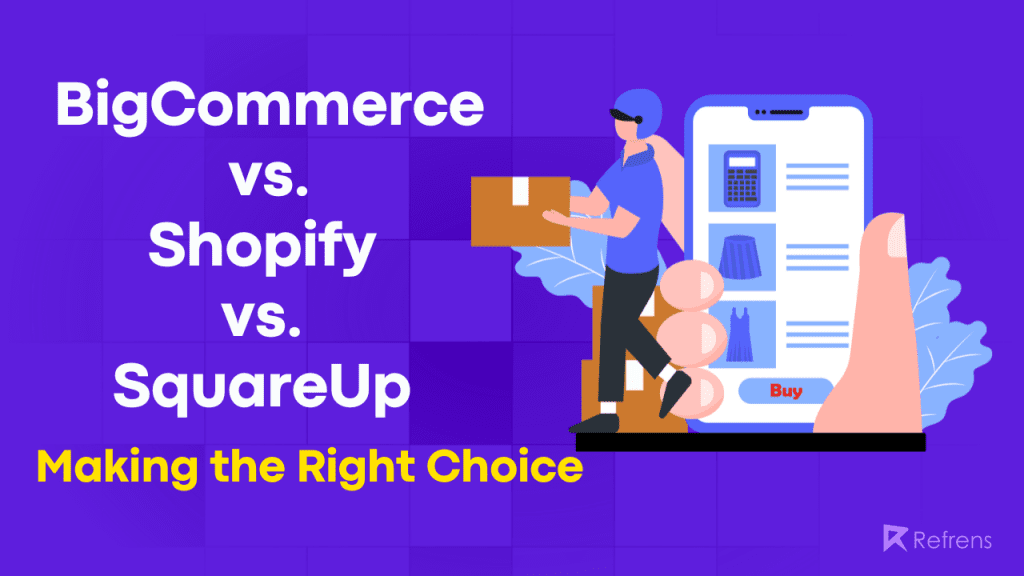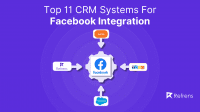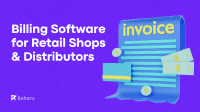In the fast-paced world of online business, choosing the right e-commerce platform is a pivotal decision that can make or break your success. Among the top players in the market, BigCommerce, Shopify, and Squareup stand out as powerful contenders, each equipped with distinctive features and advantages.
In this comprehensive blog, we will delve into the strengths and weaknesses of these platforms, providing valuable insights to assist you in making the best choice for your e-commerce venture among BigCommerce vs. Shopify vs. SquareUp. With a focus on readability and clarity, we aim to equip you with the knowledge and confidence to select the ideal e-commerce solution that ensures a seamless shopping experience for your customers. Consulting with a professional SEO company can also help you optimize your platform choice for better online visibility.
By the end, you’ll have a clear understanding of which platform aligns with your business goals and ensures a seamless shopping experience for your customers. Let’s embark on this journey of discovery and find the ideal e-commerce solution for your needs!
BigCommerce
BigCommerce is a leading e-commerce solution provider that has been recognized by various industry analysts as a top platform. Their motto is “Enterprise e-commerce, simplified.” BigCommerce caters to a wide range of businesses, from small startups to established enterprises. Their platform is designed to be flexible, scalable, and user-friendly, making it suitable for both B2C and B2B commerce solutions.
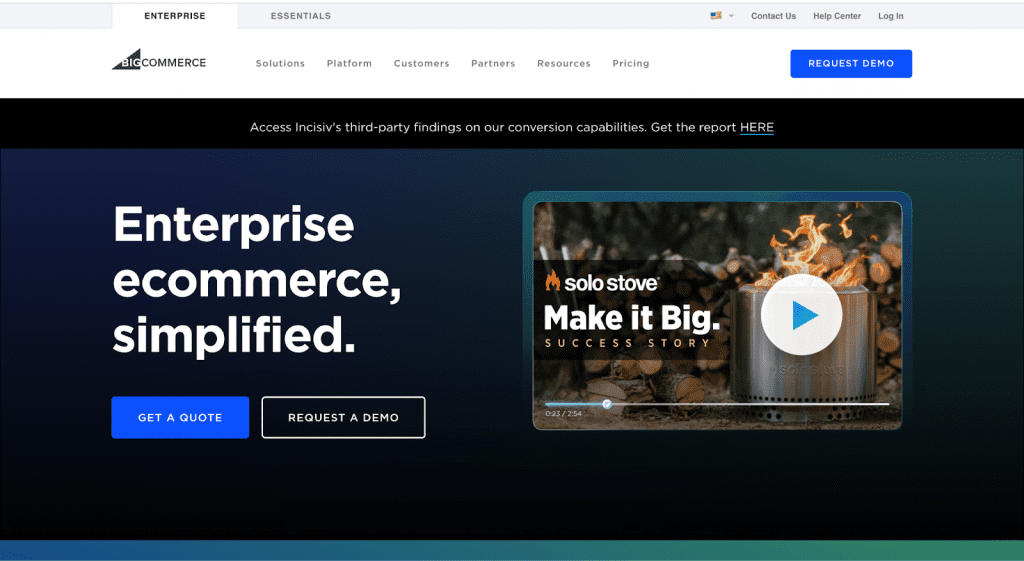
Features
- Customization Capabilities: BigCommerce promotes its “Open SaaS” solution, which combines the benefits of SaaS with the flexibility of API-enabled openness. This ensures businesses can customize the platform to their specific needs.
- Built-in Tools and Integrations: The platform offers a plethora of integrations, from app integrations to agency and tech partners. They also provide services from experts who are highly praised for trust and customer satisfaction.
- Payment Gateways and Checkout Experience: BigCommerce boasts a frictionless checkout option and essential tools for abandoned cart recovery. They also emphasize their robust security measures, including ISO/IEC 27001:2013 & PCI DSS 3.2, Level 1 certification.
- Other Notable Features:
- Scalability to handle the global shift to online purchasing.
- Speed and agility for sales growth.
- Essential back-office integrations.
- No proprietary blockers or limitations.
- 99.99% uptime, with a record of 100% uptime during cyber week for seven consecutive years.
Pricing
BigCommerce offers four monthly pricing plans:
- BigCommerce Standard — $29 per month
- BigCommerce Plus — $79 per month
- BigCommerce Pro — $299 per month
- BigCommerce Enterprise — pricing varies, depending on your business requirements
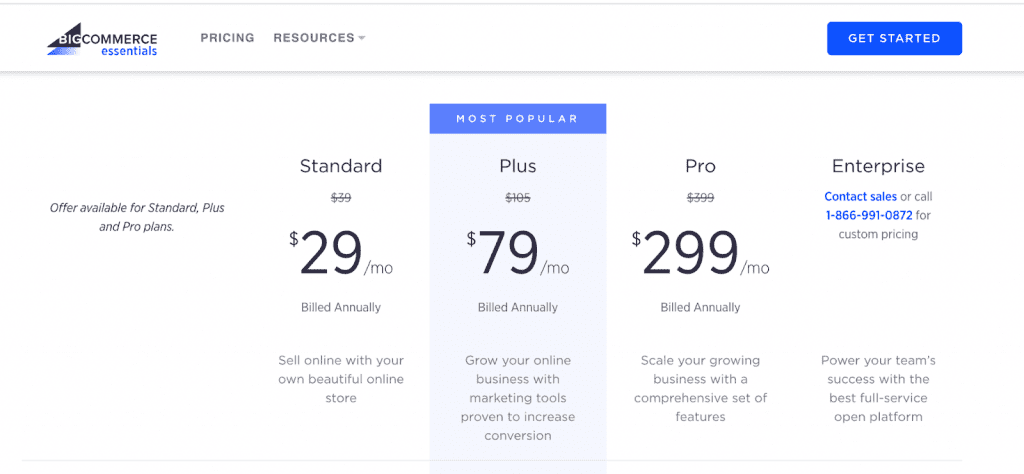
Pros and Cons
- Pros
- Integrates with best-of-breed apps
- Offers both B2C and B2B commerce solutions.
- Open SaaS platform provides limitless e-commerce potential.
- BigCommerce doesn’t charge transaction fees with any of its plans.
- Cons
- Make sure that third-party theme developers update regularly and use best practice
- BigCommerce doesn’t provide any email marketing tools at all. You’ll need to pay for a third-party app.
Ratings
- Capterra- 4.4⭐/5
- G2-4.2⭐/5
Shopify
Shopify is a renowned e-commerce platform that offers an easy-to-use online store builder. It’s trusted by millions of businesses globally and provides a fully customizable store design with a secure shopping cart. Shopify is designed for businesses of all sizes looking to establish an online presence. Whether you’re a startup or an established brand, Shopify offers tools to create and manage your online store with ease. Additionally, integrating tools like Smart Square can further enhance your Shopify store’s functionality and performance.
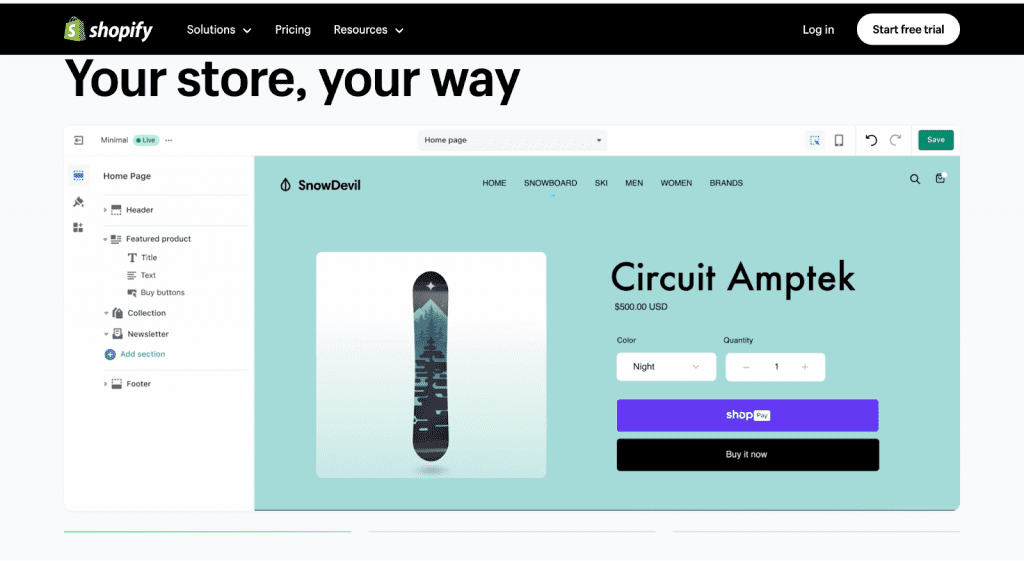
Recommended Read: Best Shopify SEO Blogs To Help You Improve Organic Traffic
Features
- Customizable Themes: Users can choose and customize their store’s design from thousands of available themes. No prior design experience or programming skills are needed.
- Inventory Management: Easily add products to your store, showcasing them with high-quality photos, pricing details, and descriptions.
- Sales and Transactions: Shopify simplifies the process of setting up payments and shipping, allowing businesses to start selling without any hassles.
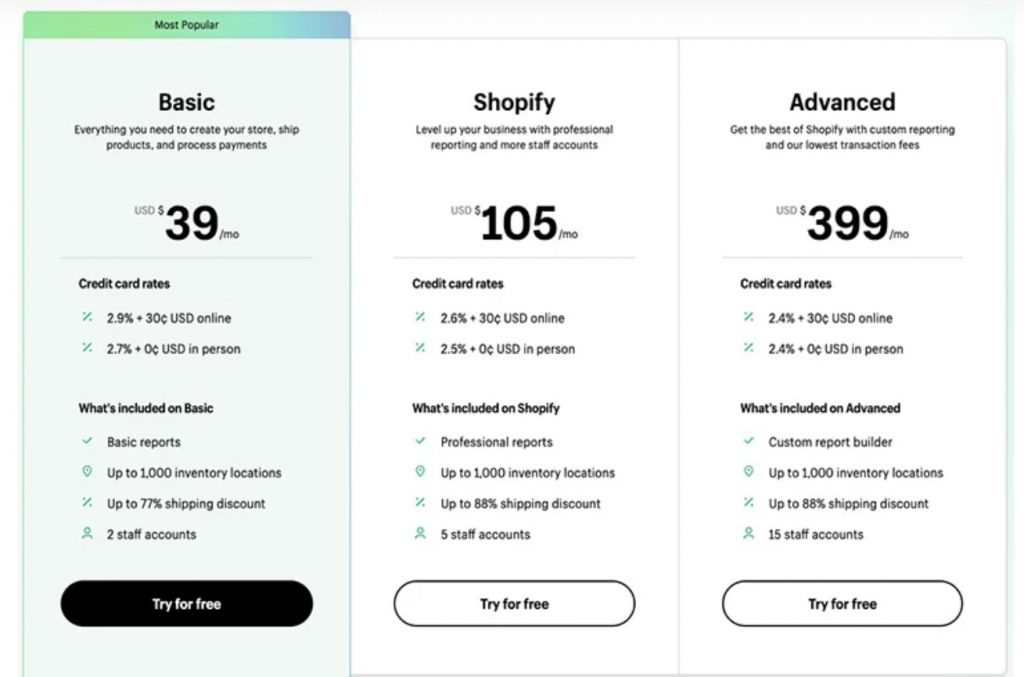
Pricing
Shopify offers these plans:
- Shopify Starter – $5/month
- Basic Shopify – $29/month
- Shopify – $79/month
- Advanced Shopify – $299/month
- Shopify Plus – $2000/month
Pros and Cons
- Pros
- Access to a Variety of Features (add products, manage your inventory, set up shipping, and create discount codes).
- Access to a Variety of Shopify Payments
- User-friendly platform which is suitable for individuals without technical expertise.
- Cons
- Limited Design Customization Options
- Shopify Processing Fees
- No Email Hosting Access
Ratings
- Capterra-4.5⭐/5
- G2-4.4⭐/5
With a business to manage, you need a good Shopify developer who can set up an effective e-commerce space and knows how to communicate your brand. Explore The Ultimate Guide on How to Hire a Shopify Developer to cater to your needs.
SquareUp
Square is a comprehensive business solution platform that offers a range of tools to help businesses manage sales, payments, payroll, inventory, and more. It’s designed to empower businesses to sell anywhere, diversify revenue streams, streamline operations, and manage staff effectively. Square caters to businesses of all sizes and types, from food & beverage establishments to beauty salons, retail stores, and professional services. It is a trusted Shopify alternative by millions of businesses worldwide.
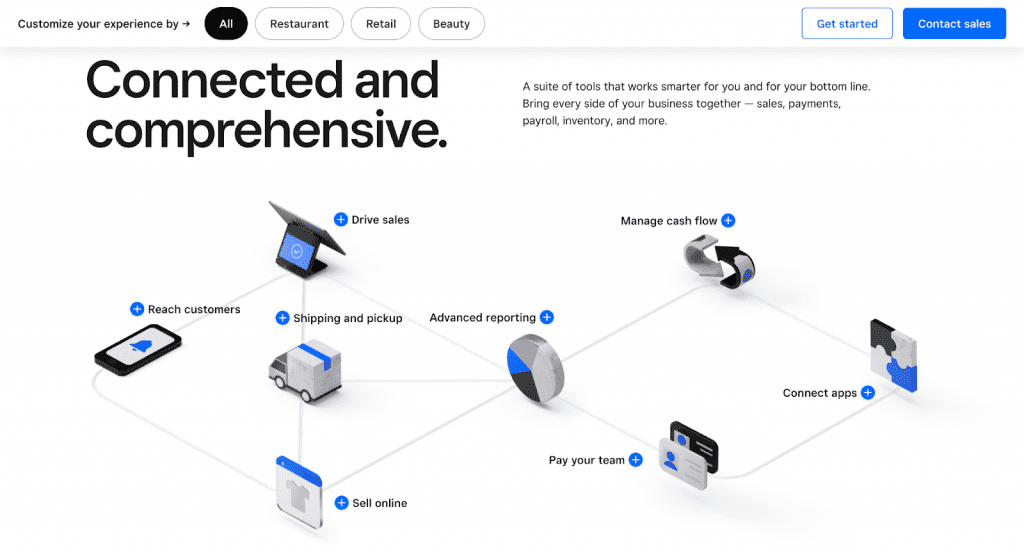
Features
- Sell Everywhere: Square provides tools to enhance the shopping experience for customers, whether they shop in person, on social media, or online. Features include managing order history, customer notes, booking recurring appointments, and offering loyalty programs via email or SMS.
- Hardware Solutions: Square offers unique and customizable hardware solutions that are intuitive and aesthetically pleasing. Businesses can choose from six different hardware options or mix and match based on their needs.
- Integrations: Square integrates seamlessly with a wide range of business tools, from website builders like Wix to top accounting software like QuickBooks. This ensures that various aspects of a business, from staff management to financial reporting, work harmoniously.
- Payment Solutions: Businesses can sell in person using Square Terminal and Square Point of Sale, reach online shoppers with Square Online, and facilitate faster payments with Square Invoices.
- Comprehensive Business Management: Square offers a suite of tools that cover every aspect of business management, from sales and payments to payroll, inventory, and more.
Pricing
- A free plan is available for basic features.
- Priced plans range from $39 per month to customized depending upon the number of features required.
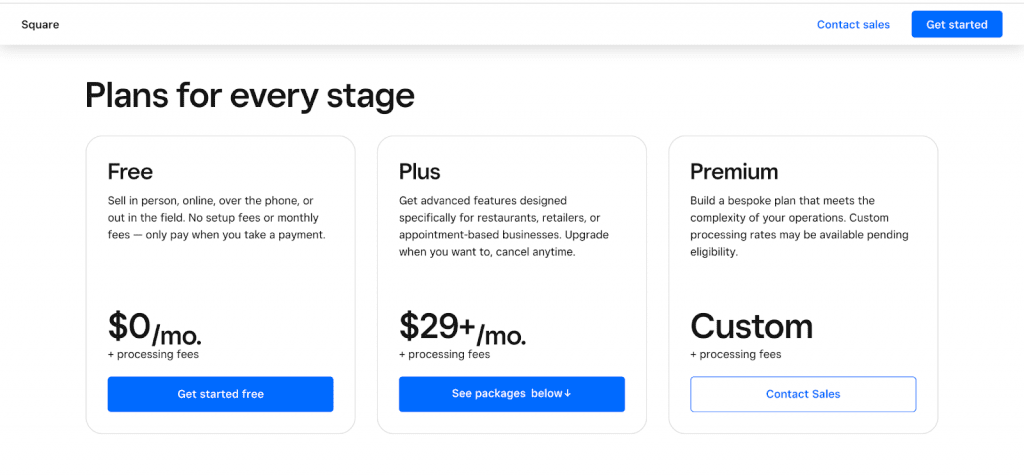
Pros and Cons
- Pros
- Square charges a flat-rate processing fee for each transaction
- Square accepts various payment methods
- Free version with lots of features
- Cons
- Higher fees for keyed-in transactions
- Limited access to transaction data
- Few features for B2B or high-volume sellers
Ratings
- Capterra-4.7/5
- G2-4.4/5
Also read: How To Create GST Invoice In Shopify?
Conclusion: BigCommerce vs. Shopify vs. SquareUp – Making the Right Choice
In the dynamic landscape of e-commerce, selecting the right platform is pivotal for the success and scalability of your business. BigCommerce, Shopify, and SquareUp each present a unique set of tools and features tailored to diverse business needs.
While BigCommerce shines with its “Open SaaS” flexibility, Shopify is celebrated for its user-centric design, and SquareUp stands out with its comprehensive business solutions. The choice ultimately boils down to your business’s specific requirements, budget constraints, and future aspirations. It’s crucial to delve deep into each platform’s offerings, weigh the pros and cons, and envision how they align with your long-term goals.
Remember, in the world of e-commerce, the right platform can be the catalyst that propels your business to new heights. Choose wisely, and here’s to your online success!
Also, learn 10 Ways To Earn Money From The Growing E-Commerce Space
Also Read: 10 Best Invoice App For Shopify
